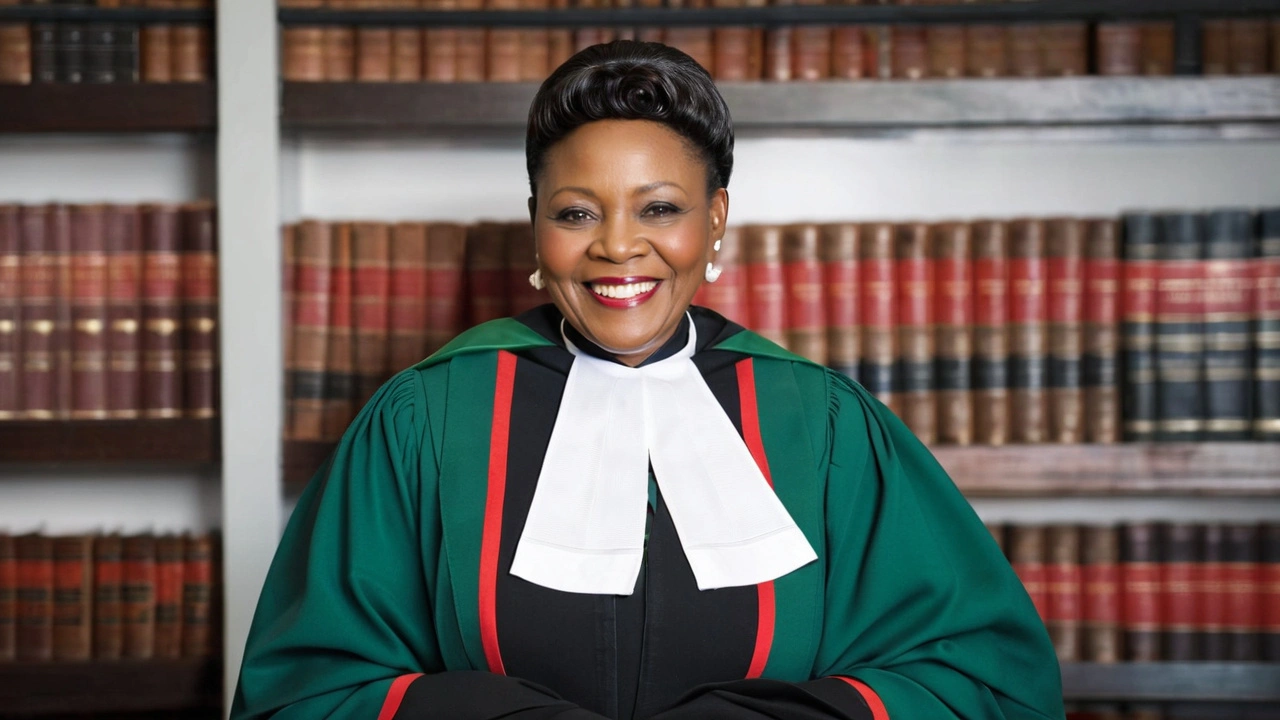ActionSA Lauds Historic Appointment: Justice Mandisa Maya as South Africa’s First Female Chief Justice

ActionSA's Reaction to Justice Mandisa Maya's Landmark Appointment
ActionSA has expressed jubilation over the appointment of Justice Mandisa Maya as South Africa’s first female Chief Justice. The political party, known for advocating change and reform, highlighted the significance of Maya's new role in shaping South Africa's judicial landscape. The announcement, made by President Cyril Ramaphosa, has been hailed as a key milestone towards gender inclusivity and transformation within the justice system.
Maya, who currently serves as the Deputy Chief Justice, is set to assume her new position on September 1. She will be taking over from Chief Justice Raymond Zondo, who has held the office with distinction. According to President Ramaphosa, the decision came after comprehensive consultations with the Judicial Service Commission (JSC) and various political leaders, ensuring that thorough deliberations were conducted before arriving at this historic decision.
A Journey of Judicial Excellence
Justice Mandisa Maya’s judicial journey is nothing short of exemplary. With an extensive career that spans numerous decades and various roles within the judiciary, Maya brings a wealth of experience to the office of Chief Justice. She began her career in the early 1990s and swiftly climbed the ranks due to her profound understanding of the law, her steadfast commitment to upholding justice, and her remarkable ability to handle complex legal matters.
Maya has served as the Judge President of the Supreme Court of Appeal, an esteemed position that underscores her leadership capabilities and deep legal acumen. In addition, she has acted as a judge in various other courts, showcasing her versatility and depth of knowledge in numerous legal domains. Her colleagues and peers highly regard her for her fair, unbiased, and diligent approach to every case she handles.
International Recognition and Leadership
Apart from her national achievements, Justice Maya also holds a prominent position globally as the vice-president of the International Association of Women Judges. This role reflects her commitment to improving the representation and influence of women within the judiciary not only in South Africa but all over the world. Her involvement in this international body underlines her dedication to fostering inclusivity, equality, and justice on a global scale.
Her leadership skills have been instrumental in nurturing a new generation of women judges and legal professionals. Under her mentorship and guidance, many young women in the legal field have found inspiration and motivation to pursue their careers with vigor and determination.
ActionSA's Vision for a Transformed Judiciary
For ActionSA, the appointment of Justice Mandisa Maya symbolizes a pivotal moment in South Africa's journey towards a more inclusive and representative judiciary. The party has long championed gender equality and the dismantling of persisting barriers that hinder the progress of women in various sectors. Hence, Maya’s elevation to the Chief Justice role aligns perfectly with the party’s vision and values.
The political landscape in South Africa has historically been dominated by male figures, and the judiciary has been no exception. However, with Maya at the helm, there is renewed hope and anticipation for substantive changes that will pave the way for more women to occupy senior positions within the judicial system. Her presence in this top judicial position is expected to bring fresh perspectives and inspire reforms aimed at achieving real and lasting transformation.
President Cyril Ramaphosa’s Deliberate Choice
President Cyril Ramaphosa’s decision to appoint Justice Maya is seen as a deliberate and strategic move towards enhancing diversity within the nation’s top judicial ranks. The president’s consultation process prior to the appointment was thorough, involving discussions with the Judicial Service Commission and other significant political figures. This approach ensured a wide-ranging evaluation of Maya’s qualifications, suitability, and readiness for the role.
In his statement, President Ramaphosa articulated his confidence in Maya’s ability to lead South Africa’s judiciary with integrity, fairness, and dedication. He emphasized that her extensive experience, both within the country and internationally, will serve as a robust foundation for her to build upon the achievements of her predecessors and address the challenges that lie ahead.
The Path Forward: Anticipations and Expectations
As Justice Mandisa Maya steps into her new role on September 1, there is widespread optimism about the positive changes she will bring to the judiciary. Her distinguished track record and the respect she commands within the legal community set a hopeful tone for her tenure as Chief Justice.
The judicial system, much like the rest of South Africa, is in a constant state of evolution. There are numerous areas that will benefit from Maya’s leadership, including the acceleration of judicial reforms, enhancement of judicial efficiency, and strengthening of public trust in the legal system. Moreover, her focus on gender inclusivity will likely encourage more women to pursue careers in the judiciary, which is crucial for achieving a balanced and representative legal framework.

Conclusion: A Historic Milestone
The journey towards Justice Mandisa Maya’s appointment as South Africa’s first female Chief Justice is not just a personal triumph but a national achievement. It represents a monumental step towards gender equality and shows a progressive shift in the country’s attitude towards women in leadership roles. ActionSA's warm reception of this appointment echoes the sentiment of many who view this as a sign of a more inclusive future.
Maya’s impending tenure is anticipated to be marked by significant contributions to the judiciary, paving the way for a more just and equitable society. Her leadership promises to embed principles of equality, fairness, and integrity within the judicial system, ensuring that the law serves all South Africans impartially and effectively.
7 Comments
Bruce Moncrieff
Wow this is huge! The first female chief justice is a game changer for South Africa and it feels like the whole continent is cheering. I can already picture the courtroom buzzing with fresh energy and new perspectives. It's a reminder that when talent meets opportunity the system can finally start to reflect the people it serves. Let’s hope this momentum carries over into real reforms.
Dee Boyd
I find it profoundly reassuring that the appointment aligns with constitutional principles of equality and non‑discrimination. The jurisprudential implications are significant, particularly regarding gender‑sensitive adjudication. Such a paradigm shift ought to be institutionalized rather than relegated to tokenism.
Carol Wild
It is curious how the mainstream narrative celebrates this appointment while conveniently overlooking the covert machinations that have shaped the judiciary for decades. One cannot help but wonder whether powerful interest groups have engineered a controlled transition to appease international watchdogs, all the while preserving their own clandestine influence. The historical pattern of elite manipulation suggests that this “historic milestone” may be nothing more than a sophisticated façade, designed to mask deeper systemic entrenchments. Moreover, the timing coincides suspiciously with upcoming legislative reforms that could further consolidate power within an opaque network of litigators and pundits. Critics who attempt to expose these undercurrents are routinely silenced through subtle legal threats and media blackouts, creating an environment where dissent is dangerous. The very institutions tasked with safeguarding justice have, over the years, become arenas for political bargaining, where appointments serve as bargaining chips rather than merit‑based selections. In this context, celebrating a single appointment without interrogating the broader power dynamics is naive at best. The pattern of token diversity, as observed in other sectors, often serves as a smokescreen, allowing entrenched structures to persist under the guise of progress. Additionally, the International Association of Women Judges, while ostensibly a champion of gender equity, has been accused of aligning with geopolitical agendas that further complicate the narrative. Some observers have noted that the organization’s funding streams originate from entities with vested interests in portraying South Africa as a model of reform, thereby enhancing their own diplomatic capital. The role of the President, though publicly portrayed as decisive and inclusive, may have been heavily influenced by back‑channel negotiations with undisclosed stakeholders. Such behind‑the‑scenes lobbying is rarely disclosed, yet it profoundly shapes outcomes. While the celebratory tone dominates headlines, a deeper investigation reveals a labyrinth of compromises, hidden pacts, and strategic placements that extend far beyond the individual’s qualifications. Therefore, the appointment should be viewed through a critical lens that acknowledges both its symbolic value and the opaque realities that accompany it. Only by exposing these layers can the public hope to achieve genuine transformation, rather than settling for a polished veneer that masks continuity of power.
Rahul Sharma
Indeed, the structural context is essential; the judicial reform agenda, the JSC’s composition, the legislative backdrop-all intertwine, creating a complex tapestry of influence, and it’s crucial to dissect each thread, especially when assessing the genuine impact of Maya’s appointment on systemic equity!
Emily Kadanec
Honestly, i think most peeps are missing the point-sure it looks good on paper, but unless the system itself is overhauled, it’s just another pretty face in the hall; people say "change" but they rarely change the rules that keep them in power, and i beleive that’s what we gotta watch out for.
william wijaya
It’s inspiring to see a leader who can bridge traditional legal frameworks with modern societal needs, especially when the courts have historically lagged behind cultural shifts. The hope is that her tenure will foster a more empathetic jurisprudence that resonates with everyday South Africans.
Lemuel Belleza
Congrats to the new chief.

Write a comment